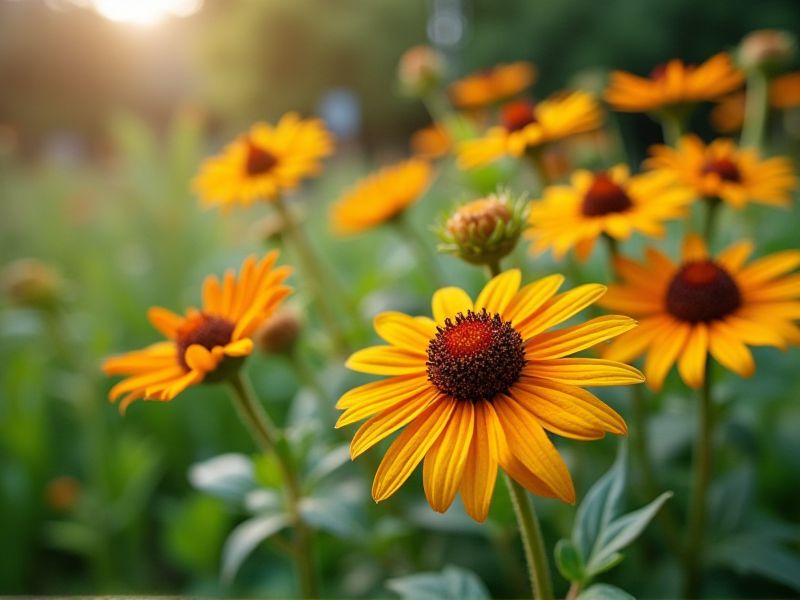
Perennial plants such as lavender, sedum, and daylilies thrive with minimal maintenance, making them ideal for busy gardeners. These hardy varieties often withstand drought and poor soil conditions, contributing to their low upkeep nature. Native plants like coneflowers and black-eyed Susans not only enhance local biodiversity but also attract beneficial pollinators. Furthermore, selecting pest-resistant perennials can reduce the need for chemical interventions, promoting a healthier garden environment. Incorporating these resilient plants into your landscape will ensure vibrant blooms year after year with little effort.
List of some Perennial plants that require minimal care
- Daylily (Hemerocallis)
- Coneflower (Echinacea)
- Lavender (Lavandula)
- Hostas (Hosta)
- Sedum (Sedum)
- Black-Eyed Susan (Rudbeckia)
- Yarrow (Achillea)
- Russian Sage (Perovskia atriplicifolia)
- Ornamental Grasses (Various Genera)
- Catmint (Nepeta)
Important things about Perennial plants that require minimal care
Drought Tolerance
Perennial plants such as lavender, sedum, and daylilies are excellent choices for drought-tolerant gardens, thriving in low-water conditions while providing seasonal beauty. These plants often feature deep root systems that help them access moisture below the soil surface, reducing the need for frequent irrigation. By selecting native species and well-adapted perennials, you can create a sustainable landscape that minimizes maintenance while supporting local ecosystems. Incorporating mulch and grouping plants with similar water needs can further enhance their drought resistance and overall health.
Low Maintenance
Perennial plants, such as berberis, daylilies, and sedums, thrive in a variety of climates while requiring minimal care. These resilient species return year after year, providing color and texture to your garden with little effort. Drought-resistant varieties like lavender and echinacea are particularly advantageous, as they require less watering once established. Incorporating these low-maintenance perennials into your landscape not only enhances aesthetic appeal but also saves you valuable time and resources in garden maintenance.
Disease Resistance
Perennial plants, known for their longevity, often exhibit robust disease resistance, allowing for a thriving garden with minimal maintenance. Varieties such as Echinacea, Rudbeckia, and Daylilies are particularly resilient, thriving in diverse climates while naturally repelling common pests and diseases. By selecting these hardy species, you can enjoy vibrant blooms year after year without frequent intervention. Incorporating disease-resistant perennials not only enhances your landscape but also supports sustainable gardening practices.
Hardy In Various Climates
Perennial plants such as daylilies, sedums, and hostas thrive in diverse climates, showcasing remarkable hardiness and resilience. These low-maintenance species not only adapt to varying temperatures but also require minimal watering and fertilization once established. With their ability to endure drought and poor soil conditions, they offer a vibrant landscape solution for gardeners seeking beauty without the demanding upkeep. By incorporating these hardy perennials into your garden, you can enjoy a sustainable and colorful display throughout the seasons.
Long Lifespan
Perennial plants, known for their long lifespan, thrive in gardens while requiring minimal care and attention. Varieties such as Hellebore, Daylily, and Lavender not only add vibrant color and texture to your landscape but also offer excellent resilience against harsh weather conditions. These low-maintenance options typically withstand years of growth, making them ideal for gardeners seeking an enduring floral display. By incorporating these hardy perennials into your garden, you can enjoy a beautiful, sustainable environment with minimal effort.
Attract Pollinators
Perennial plants, such as coneflowers (Echinacea), black-eyed Susans (Rudbeckia), and lavender (Lavandula), are excellent choices for attracting pollinators while requiring minimal care. These resilient varieties thrive in diverse conditions, providing a reliable source of nectar and pollen throughout the growing season. By incorporating these plants into your garden, you not only support essential insect populations like bees and butterflies but also enhance the beauty of your outdoor space with vibrant colors and scents. Furthermore, their low-maintenance nature allows you to enjoy a flourishing garden without extensive upkeep, making them a practical choice for busy gardeners.
Seasonal Interest
Perennial plants are ideal for gardeners seeking low-maintenance options that still provide vibrant color and texture throughout the seasons. Many varieties, such as Sedum, Echinacea, and Daylilies, thrive in diverse climates and can withstand drought conditions, making them perfect for busy lifestyles or beginner gardeners. These resilient plants return year after year, enhancing your garden with minimal intervention, requiring only occasional deadheading or division for optimal health. Incorporating such perennials not only simplifies your gardening routine but also contributes to local biodiversity by attracting pollinators and enriching the soil.
Soil Adaptability
Perennial plants, known for their resilience and ability to thrive in various soil types, significantly enhance garden ecosystems with minimal maintenance requirements. These plants, such as daylilies and sedums, adapt well to diverse soil conditions, including sandy, clay, and loamy textures, making them ideal for low-care gardening. Their deep root systems improve soil structure, promote water retention, and support microbial life, contributing to a healthier garden environment. By choosing adaptable perennials, you can enjoy a vibrant landscape with reduced upkeep while benefiting from their ecological contributions.
Mulching Benefits
Mulching around perennial plants significantly enhances soil moisture retention, reducing the need for frequent watering. Organic mulches, such as wood chips or straw, decompose over time, enriching the soil with nutrients and promoting healthy root development. This natural barrier also suppresses weed growth, ensuring that your perennials receive maximum resources without competition. By applying a layer of mulch, you can enjoy vibrant perennial blooms while minimizing maintenance tasks throughout the gardening season.
Natural Pest Deterrents
Perennial plants such as lavender, mint, and marigolds not only enhance your garden's aesthetic but also serve as natural pest deterrents. Lavender emits a strong fragrance that repels moths and mosquitoes, while mint's aromatic leaves deter ants and aphids, making it an excellent low-maintenance choice. Marigolds release compounds that can inhibit nematodes and attract beneficial insects, creating a healthier garden ecosystem. By incorporating these hardy perennials, you can effectively reduce pest issues while enjoying minimal upkeep throughout the growing season.
